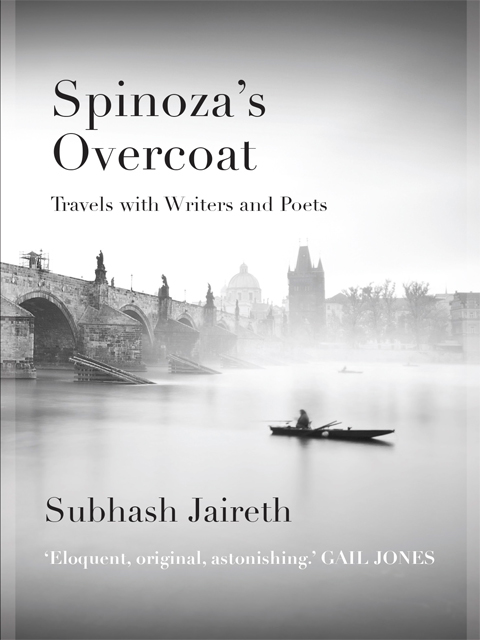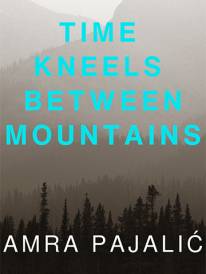Spinoza's Overcoat: Travel with writers and poets

Travel with Writers and Poets
The new essay collection from Subhash Jaireth explores the author's travels to the houses of some of the world's greatest writers. 'It starts to rain as I step out of my hotel ....' So begins Spinoza's Overcoat, Subhash Jaireth's striking collection of essays on the writers, and their writing, that have enriched his own life. The works of Franz Kafka, Marina Tsvetaeva, Mikhail Bulgakov, Paul Celan, Hiromi Ito, Dutch philosopher Baruch Spinoza and others ignite in him the urge to travel (both physically and in spirit), almost like a pilgrim, to the places where such writers were born or died or wrote. In each essay a new emotional plane is reached revealing enticing connections.
As a novelist, poet, essayist and translator born into a multilingual environment, Jaireth truly understands the power of words across languages and their integral connections to life of the body and the spirit. Drawing on years of research, translation and travel Spinoza's Overcoat – and its illuminations of loss, mortality and the reverie of writing – will linger with readers.
Subhash Jaireth was born in India. Between 1969 and 1978 he spent nine years in Russia studying geology and Russian literature. In 1986 he migrated to Australia. He has published writing in Hindi, English and Russian and his novel After Love (Transit Lounge 2012) was published in Spain in 2018.
Spinoza's Overcoat: Travel with writers and poets
Transit Lounge
Author: Subhash Jaireth
RRP: $29.99
Interview with Subhash Jaireth
Question: What inspired the idea for Spinoza's Overcoat?
Subhash Jaireth: The essays in Spinoza's Overcoat are about writers and poets who worte their works because they were morally and ethically compelled to write them. Without such an imperative, their writing would seem purposeless, and their stories and poems wouldn't find the empathetic readers they need. If stories have to live and endure, they need the attention and engagement of such readers; without them they are easily forgotten and mislaid in the cacophony that surrounds us.
Question: Can you share with us, a story from your travels?
Subhash Jaireth: In 1978, the year I left Moscow, I met an old Russian lady in Novocheromushkinsk Market. This was a market where ordinary Soviet citizens (mostly non-Russians) came to sell vegetables, fruits, flowers, cheese, fish and meat produced by them on their own small private plots.
I was busy looking for some fresh tomatoes when an old lady turned to me, smiled and asked, 'Are you a Hindu?' I was surprised by this question because in the nine years that I had spent in Moscow I had met only a few Russians who were aware of the difference between an Indian (Indiits) and a Hindu (Indus).
We came out of the market and walked up to a bench outside. She took out a loaf from her bag and started feeding a flock of pigeons.
'You must know about Rabindranath Tagore', she said, 'the Bengali poet who wrote Geetanjili. In 1930 he came to Moscow and a big civic reception was organised in his honour. I was six then and my mother took me to the reception. You know I was the young pioneer girl who brought him a bouquet of carnations. The poet looked at me with his dark bright eyes, smiled and hugged me. I still remember the hug.
She paused for a few minutes and then suddenly began reading from memory a few lines of Tagore's poem, first in Bengali and then in Russian translation.
Question: Which of the writers houses holds the most memories, for you?
Subhash Jaireth: It is the house of Marina Tsvetaeva on Borisoglebskii Street in Moscow. It hosts a wonderful museum. I visited the house several times to attend lectures, readings and performances. This is the house in which Tsvetaeva lived with her two daughters, and this is the house she left behind when in 1919 she boarded a train going to Berlin.
Question: What message do you hope to spread with Spinoza's Overcoat?
Subhash Jaireth: I hope reading this book will turn its readers into inquisitive explorers ready to open doors and windows to the world of writing other than their own beloved English. The world of global literature has incredible authors writing in languages other than English. I'll be happy if my essays inspire English readers to shake hands with at least a couple of books written in the language other than their primary language.
Question: What's next, for you?
Subhash Jaireth: I am editing a book of my poems containing three narrative sequences: Moscow – 1974: (an oratorio in two voices); Songs of Silence (improvisations after Japanese haikus) and Aflame (a story in the voice of a young Tibetan monk who commits an act of self-immolation to protest against the Chinese occupation of Tibet).
Interview by Brooke Hunter
Transit Lounge
Author: Subhash Jaireth
RRP: $29.99
MORE



